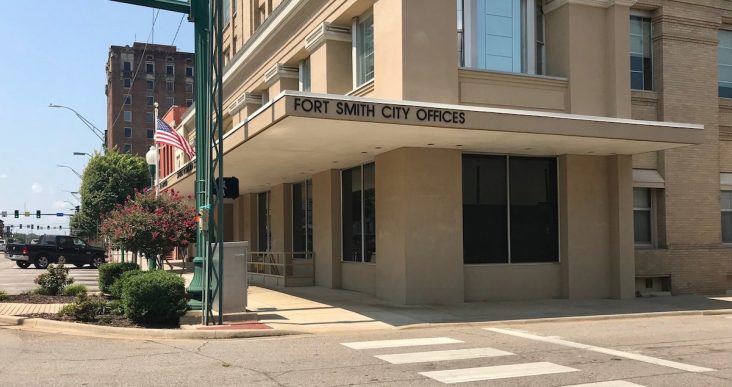Fort Smith Board approves vote on tax extensions with 8-year terms
by February 22, 2022 8:28 pm 881 views

During a special meeting Tuesday night (Feb. 22) the Fort Smith Board of Directors approved two ordinances that will set a special election May 24 during the state primary election that will allow citizens the opportunity to vote on the continuation of a 1% sales tax.
The first ordinance approved by the board will renew a 0.25% sales tax that is evenly allocated between the city’s fire department and city’s parks and recreation department. Directors voted 5-2 to extend the tax eight years, with collections from Sept. 30, 2022, to Sept. 20, 2030.
Directors Andre Good and Jarred Rego opposed the eight-year duration with both expressing a desire for the tax to continue for 10 years. The 0.25% sales tax that is evenly allocated between the two departments is set to expire on Sept. 30. That tax generated $5.7 million in 2020.
The second ordinance will extend a 0.75% sales tax from Jan. 1, 2023, to Dec. 31, 2030, with 83.3% of the revenue going to federal consent decree work on the city’s water and sewer system, and 16.7% directed to the city’s police department. Again, Directors Rego and Good opposed the eight-year extension, favoring a 10 year extension. The 0.75% sales tax was approved to pay the debt incurred for water and sewer projects and those bonds will be paid in full during the third quarter of 2022. This means the sales tax will end on Dec. 31.
The board informally agreed during a study session Monday (Feb. 21) to form a sales tax advisory committee made up of Fort Smith citizens who would review sales tax revenues and the city’s spending of those funds. That committee could meet monthly or quarterly or however often they set and would report to the board and in essence the public on how the money is being spent. The board also informally agreed during the study session that if the 0.75% sales tax is approved by the voters in May, that there will be a three year freeze on sewer rates and if future boards opt to raise sewer rates any more than 3.5% after that three years, the sales tax would cease. Those issues will be addressed at the March 1 board meeting, City Administrator Carl Geffken said.
The move Tuesday followed the board’s canceling of a Feb. 8 election for the sales tax extension. The board voted Dec. 21 to halt that vote in an effort to gather more citizen input.
Fort Smith attorney Joey McCutchen had said he and members of Citizens Against Unfair Taxes were opposed to the original 10-year extension for the taxes. He told the Board Tuesday night before the vote on the ordinances that he and members of the Citizens Against Unfair Taxes supported the idea of a commission and asked that representation from the group and from the Arkansas Transparency in Government group be allowed on the commission.
McCutchen also said he appreciated the three-year freeze on sewer rates and caveat of the no more than 3.5% sewer rate increase after three years for the duration of the tax.
“I appreciate that the board took the time to have open discussions with the citizens on this and that they backtracked on the original proposal,” McCutchen said. “The city is at a crossroads. It is important to have funding for each of these items. … With eight years, each of these will see progress and it truly will make Fort Smith the best of the best.”
Director Lavon Morton, originally in favor of a 10-year extension, said the eight years limit was a step in the right direction to show the citizens of Fort Smith they could trust their local government to listen to them and do what was best for the city.
“It is very positive that we have what I consider a collaborative agreement on this,” Morton said.
He said if the vote passes, especially by a large majority, it will send a strong message to outside entities that the city and the citizens are taking responsibility and working to pay for what needs to be done.
After years of failing to maintain water and sewer infrastructure to federal standards, the city entered into a federal consent decree with the U.S. Environmental Protection Agency and the federal Department of Justice in late 2014. The consent decree required the city to make an estimated $480 million worth of sewer upgrades over the course of 12 years. Because of inflation and the state of the city’s sewer system, that number is estimated to be closer to $650 million.
